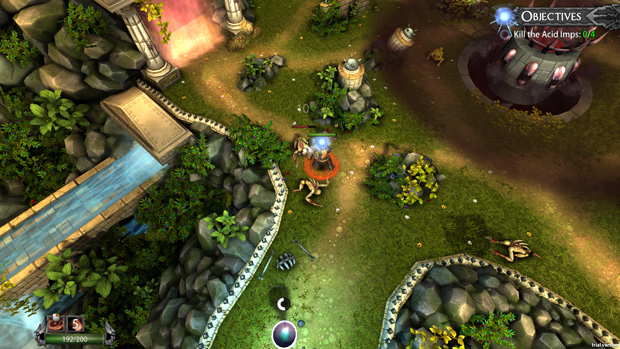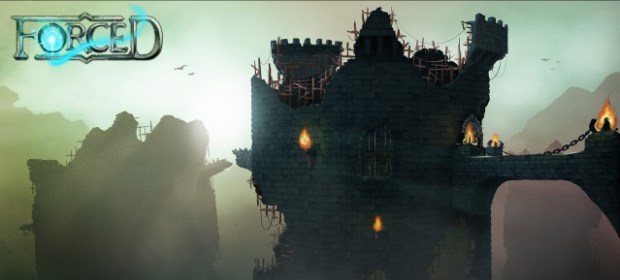Forced is a little indie brawler from Danish developer BetaDwarf. This, the 12-man company’s first major release, could be best described as World of Warcraft meets SmashTV. While it borrows a lot of the visual and fantasy elements from WoW and the frantic arena-based combat style of the classic NES title, the game does add enough of its own ideas to distance itself from its influences. The problem is that, while it doesn’t do anything particularly bad, it doesn’t do anything particularly great either; it all just feels a bit… well, meh.
The first thing that might whizz past you in a blur of apathy is the story. The character you are pulling the strings of doesn’t come with a name, so I lovingly christened him Naked Russel McUnderpants. Born into a tribe of slaves, your sole purpose in life is to compete in the gladiatorial arenas, where you face a series of trials for the amusement of the gods – pretty much a bum deal, especially since no one has ever come back alive. But you are a naked man of honour, so rather than run away you have spent the last few years in training with the hope of being the exception to the rule.

It ain’t all bad tough. You’ve got a floating white orb thing called Balfus to guide you through the trials in an attempt to give you a fighting chance, and also to provide a source of voice talent as your character has no tongue, presumably. So after a short tutorial, you face your first trial against Wrathhoof. It’s all going to plan, until he completely wigs out for no apparent reason, other than being defeated and you’re forced (now I get it) to kill him. That doesn’t go down too well in the land of the gods, but since you were sent there on a suicide mission anyway, who gives a damn? Not Mr. McUnderpants anyway, so on with the rest of the trials.
Said trials all involve around 6 stages culminating in a boss battle. The stages usually revolve around defeating hordes of enemies while accomplishing certain tasks like destroying statues or solving puzzles. Before each stage you choose one of four weapons: dual daggers, an axe, a shield or a bow, each with its own style and unlockables. Daggers are fast but weaker, the bow is ranged, the axe is slow but powerful and so on. Depending on how efficiently you complete each stage, a number of crystals are awarded that can be used to unlock a sizeable amount of extra abilities such as increased damage or special attacks. To be fair, the weapon load-out may seem deceptively small, but with all the upgrade choices there is a lot of variation and uniqueness to be found within each. The game also allows you to revisit completed trials to unlock more crystals, which is nice if you find yourself under-equipped later in the game. The ability to change weapons at any time before a trial also helps to find new approaches to problematic areas.

The combat is simply enough and handles like a twin stick shooter. Your main attack is complemented by both special attacks with greater damage and passive abilities that increase certain weapon or character attributes. “Marking” enemies is an attempt to add a fresh slant on the button bashing but it doesn’t seem that effective. For each hit landed on an enemy, a little white dot appears above their health bar. After building this up to a maximum of 5, landing a special attack will take a considerable chunk of their health. It’s useful for bosses and larger enemies, but a bit pointless for lesser adversaries, because you just want to blow through them to get them out of the way before tackling the big boys. Which you can, of course, but if the mark system wasn’t applicable to them then it would be much easier to do so. It also gets difficult to keep track of multiple mark counts when you’re right in the thick of it.
Balfus quickly becomes an integral part of the game and switches from mentor to side-kick pretty early on. Guiding him around the map by tapping space bar, you can command him to pass over pedestals to alter his form. For example, healing shrines allow him to cast a HP-recharging circle around you, while another shrine turns him into a floating ball of TNT. The kicker is that you can only call him towards you, so quick and precise positioning is needed. It’s a nice little mechanic and adds a bit of lateral thinking to the trials, outside of massacring anything that moves, but it can get very infuriating when you’re trying to get him to float the right direction while simultaneously keeping the swarm at bay.

If you find the single-player campaign overwhelming then you can jump into co-op mode and get some help. Available in local and online flavours, you and up to 3 others can take on the same trials, slightly tweaked to accommodate the extra hands. Balfus is back but remains in singular form and now takes orders from everyone. So as you can imagine, it gets pretty confusing. As anyone who has played any game online ever knows, teamwork ranks way, way down on a stranger’s list of priorities. That said, the co-op mode is pretty fun when it goes right, and is much more rewarding than flying solo.
As mentioned earlier, Forced borrows the visual styling of World of Warcraft; bright, cartoonish and colourful. It’s fairly pleasing to the eye and it strikes a nice balance between keeping the details low enough to manage large groups of enemies but without making things completely bland. It’s fine – just fine. As is the sound design, audio effects and score. The voice acting is a little uneven, but it’s not prominent enough to detract from the game.

VERDICT: Forced is an enjoyable experience, more or less. The combat is fluid but feels a little too loose and unsatisfying, as though you’re not quite connecting that large axe with that demon’s face. The mark system is a brave attempt but kind of unnecessary at times, while Balfus is useful in single-player but potentially all over the place in co-op mode. But the game is far better when played with friends, and the single-player is meaty enough in its own right. All in all, it’s a fun little time-waster and pretty well put together – but I won’t be forcing anyone to try it.

DECENT. A 6/10 indicates that, while this game could be much better, it still has a fair amount to offer the player. It might be an interesting title sabotaged by its own ambition, or a game denied greater praise by some questionable design choices. Don’t avoid it outright, but approach it with caution.





